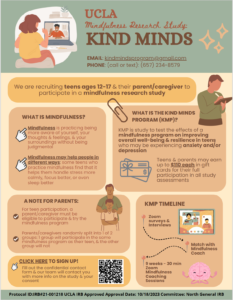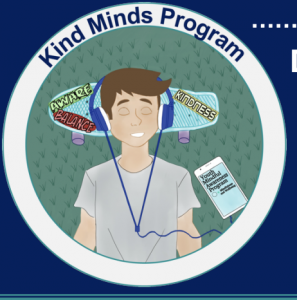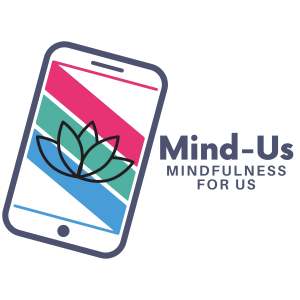Current Research

ALACRITY Center Grant
https://www.stand.ucla.edu/alacrity
The CALMA lab is working on the following projects as part of a NIMH funded ALACRITY Grant:
Aim 1. To understand stakeholders’ (community college or CC students) perspectives on facilitators and barriers to mental health screening and initial uptake of mental health services in order to develop interventions to enhance engagement of CC students into STAND at ELAC. During Year 1, nine focus groups, each with 5-6 participants, will be used to explore factors that affect willingness to enroll in STAND such as perceptions of STAND effectiveness, perceived burden associated with STAND, and the impact of perceived and personal stigma in seeking mental health services.
Aim 2. To develop a low-intensity, informational engagement intervention to increase awareness of anxiety and depression among CC students and thereby improve screening rates of STAND at ELAC. Findings from Aim 1 will be used to guide the development of community informed video testimonials (a social contact intervention) about participation in STAND in order to increase rates of those who sign up to be screened.
Aim 3. To develop and test the effectiveness of a culturally embedded informational intervention to activate initial service uptake into STAND among ELAC students. During Year 3, we will examine whether a digital fotonovela intervention with aspects of motivational enhancement therapy facilitates initial service uptake (completion of a STAND orientation visit).
Aim 4. To develop and examine the effectiveness of a collaborative engagement intervention that utilizes peer coaches to enhance service uptake into STAND among ELAC students. During Year 4, we will examine whether a peer led engagement intervention by telephone enhances initial service uptake in STAND. ![]()

The Youth Mindful Awareness Program (YMAP)
Aim: The goal of YMAP is to examine the efficacy of an app-based, coach-assisted mindfulness intervention to prevent internalizing disorders in youth with high trait negative affectivity (tNA) – as measured by ecological momentary assessment (EMA). In collaboration with researchers at UCLA, Northwestern, and Vanderbilt, we intend to assess the feasibility, acceptability, and tolerability of this innovative approach to serving adolescents and their families. 
Aim: The primary aim of this pilot randomized controlled trial is to examine the effectiveness of an app-based mindfulness based intervention which emphasizes practices of kindness for underserved adolescents with anxiety and depressive disorders, using two formats: one which teaches mindfulness to the teen only and the other which includes both the teen and the parent.


 The Mindfulness For Us or Mind Us Project
The Mindfulness For Us or Mind Us Project
The Mindfulness for Us, or Mind-Us, project aims to leverage widespread smartphone ownership among people of color (PoC) to deliver mindfulness meditation to individuals who experience elevated levels of race-related stress. Using a self-guided, app-based approach, this digital intervention may be especially well suited to reach PoC who would not seek or receive services otherwise.
